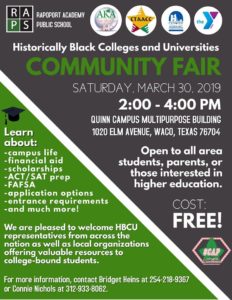Interview by Ty Hall
Have you ever been Gobsmacked? Utterly astonished and astounded? On April 6 you have an opportunity to explore what it means to be “Gobsmacked” through an evening of modern dance, music, food and wine presented by Brooke Schlecte and Waco’s Out on a Limb Dance Company.
Out on a Limb
L. Brooke Schlecte, founder and artistic director of Out on a Limb Dance Company, was born and raised in Waco, Texas. After graduating from Reicher Catholic High School in 1999, she attended Kilgore Junior College, where she performed with the world-famous Kilgore College Rangerettes. After graduating from Kilgore in 2001, she continued her dance education at the University of Texas in Austin where she graduated with honors in 2003 with a Bachelor’s of Fine Arts in Dance. “I have always danced. It has always been a part of me.” Says Brooke, “It has continued to guide me, teach me, excite me, challenge me, and keep me curious. I just keep searching and digging for the areas I love most and the ideas I want to explore with choreography.”

Schlecte graduated with a Master’s of Fine Arts in Dance from TWU in 2007. That same year she moved back home to Waco and founded Out On A Limb Dance Company. Since its formation, Out On a Limb Dance Company (OOLD) has choreographed and performed across the nation, including Texas, Oklahoma, California, and New York.
Schlecte and Out on a Limb bring the dynamic element of modern dance to Waco’s coalescing arts scene. According to their website, “OOLD is passionate about investigating new ways of thinking about movement and dance-making, without abandoning the rich traditions of formal dance. We believe that the creative mind and body at every age is intuitive and worth sharing with others, therefore, we aspire to redefine the body in motion and propose a new model for dance in the community of Waco and beyond.”
But how does all that lead to being gobsmacked?
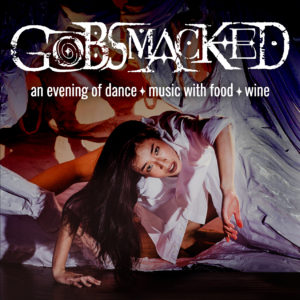
In the winter of 2018 Schlecte discovered and quickly immersed herself in an ancient tool for self-exploration that is enjoying a renaissance in recent years — the Enneagram. The Enneagram — from the Greek words “ennéa,” meaning “nine” and “grámma,” meaning something “written” – helps us understand the human psyche by mapping and explaining nine interconnected personality types.
Through the healing and journey brought about by studying the Enneagram, Schlecte realized she uses the art of dance to develop understanding, clarity, healing, and as an agent for change. She found she feels strength in this space because it is the thing in her life that is risky and “out on a limb” and somehow that risk balances her other, more safe, way of living.
In the process of developing Gobsmacked, she began collaborating with dancers, musicians, costume designers, photographers and videographers and very quickly a small dream percolated into the giant vision that you will have the chance to experience on April 6.
Gobsmacked is about the beauty that lies in the deep, unearthed cervices of our being. It is about finding the people around you who are willing to show you who you are and see who you really are. Finding the unmasked self is scary and sometimes ugly. When we pull off the veil it is easy to feel gobsmacked.
Brooke and her company have been developing Gobsmacked for the last two years.
What’s the creative process that leads to a “Gobsmacked?”
“My creative process as a choreographer changes with each new project,” says Schlecte. “So many variables influence me: life situation, time, money, how many dancers I have, how the dancers engage in the process, music, or music collaboration, concept, vision, venue, and audience (probably more things).
“So, I gather what I know about what I have and what my vision is and start there. Improvisation and collaboration with dancers and musicians really help create the pallet of the movement language and from there usually a story unfolds (abstract or not). I try hard to follow the piece without imposing insecurities or judgements and really let the dance live for a while. We take lots of videos and have many discussions about the piece that is unfolding.”
“From there, it really is all about editing, feedback, refining, and clarifying dynamics that really bring the piece to life. During the process a lot of context questions get answered: where are we, who are we, what do we see, what are we wearing, what world do we live in, what is our relationship to each other, what are the sounds, and finally how would we name this world (i.e. dance title).”
“In my opinion, modern dance is the dance form that keeps asking questions, keeps evolving, and allows the choreographer and performers to grow and flourish with each new dance process. It is a dance form that has the human experience in mind. We are not just dancers pretending to be dancers. We are people, moving, exploring and understanding a movement language and creating new ideas with it.”
“Modern Dance is a form that has infinite ways of developing when each person interacts in the process. I love how modern dance is never the same, there is never a code to follow, there is less good vs. bad in measuring dance, and more of a life-long process. I believe that no dance is every really finished. There are times that products are presented to the audience, but there are always more places to explore and dig in each piece.”
How to see Gobsmacked…
You can get tickets to Gobsmacked here: Tickets. You can learn more about Out On A Limb Dance from their website: www.outonalimbdance.com or Facebook page: https://www.facebook.com/outonalimbdancecompany/. “The show has something for everyone,” says Schlecte, “with food, drinks, dance, theatrical elements and music. I really try to create an experience that is new and engaging with one that is comfortable in familiar.”
What’s next for Schlecte and Out On a Limb?
“I am completely consumed in Gobsmacked and cannot think about anything else at the moment,” says Schlecte. “And after this show, it will be a process of recovery and reflection. My plans are to not force my next idea or what that concept will be. But, I do know that I want to do something like Gobsmacked again in the future. Gobsmacked has probably been the most fun creative experience so far and I very much intend doing it again.

This post based on an interview conducted by Ty Hall. Ty Hall lives in Texas, makes up stories, and tries to be good.
The Act Locally Waco blog publishes posts with a connection to these aspirations for Waco. If you are interested in writing for the Act Locally Waco Blog, please email [email protected] for more information.
By Amy Cook
If you could go anywhere in the world, where would it be? The pyramids of Egypt? To Italy to see the Leaning Tower and taste authentic pizza? Or perhaps the beautiful beaches of Greece? People ask each other this question all the time, but why not take it seriously!

Some people don’t have anyone to travel with, some are intimidated by international travel, and some are worried about finances. That used to be me, then I took a community trip through MCC to Australia and New Zealand. I would never have attended a Maori dinner, hiked through beautiful scenery punctuated by steaming geysers, or visited the Sydney Opera House if it hadn’t been for that trip. Being able to share that experience with a great group of people made me feel comfortable and happy.
That brilliant experience inspired me to organize “Waco group Travel.” Waco Group Travel aims to alleviate the fear and intimidation factor so more Wacoans can enjoy traveling the world together.
Each year we will plan an international adventure booked through a tour agency. Our first destination will be Barcelona, Spain with dates set for Sept 12-17, 2020. This advanced date will give you plenty of time to plan and keep monthly payments low, making the trip more accessible. The price of this adventure includes flights, transportation to and from your destination airport, hotels, a few fantastic excursions, and a few meals.

Did you know Barcelona is the first city to win a RIBA Royal Gold Medal for its architecture? It is also considered the “best beach city” in the world by National Geographic. Activities for the Barcelona destination include Flamenco show and Tapas, a trip to Park Guell and Hospital de Sant Pau, and an authentic cooking class to fully immerse yourself in another culture. There is also free time to explore on your own or together- no person left behind!

Interested? Come to the information session for the trip on April 4th, 2019, at 6:45pm. Please RSVP at the FB page or phone number below for location of meeting and other details.. Carpe Diem!
For more information visit our Facebook page at http://www.facebook.com/wacogrouptravel or the website at http://www.grouptoursite.com/tours/amycook1. or call 254-292-3275.

Amy Cook has lived in the Waco area doing massage therapy for the last 10 years and loves it!! In college she spent a month studying Shakespeare in England and this August will be visiting Russia. Amy loves group travel, but wasn’t able to find any local opportunities and so wanted to create a way to bring fellow locals with wanderlust together. She loves museums, outdoors, and random acts of kindness.
The Act Locally Waco blog publishes posts with a connection to these aspirations for Waco. If you are interested in writing for the Act Locally Waco Blog, please email [email protected] for more information.
By Bridget Heins
Educators and parents know that a student’s journey to college begins long before their senior year. Exploring higher education options begins as early as middle school and in some cases earlier. While this task may seem overwhelming, college fairs are one tool in determining what each institution of higher education has to offer.
Every college is unique and offers its own brand of experience for students. Some choose a college that excels in their particular field or has a reputation for successful job placement upon graduation. Others may choose a particular institution based on academic rigor, sports prowess, or family connection. Students have options, and narrowing the choices to the find the right fit depends on knowing what questions to ask. The best way to practice this skill is to speak with college recruiters whenever possible.
Central Texas students have the opportunity to attend a unique college fair this weekend in Waco…and it’s FREE! The 2nd Annual Central Texas Historically Black Colleges and Universities Community Fair will take place in the City of Waco’s Multi-Purpose Building on Saturday, March 30, 2019, from 2:00 – 4:00 pm. This event is possible through a partnership between Rapoport Academy Public School, Alpha Kappa Alpha Sorority, Inc., Delta Alpha Omega Chapter, Cen-Tex African American Chamber of Commerce, Centex Hispanic Chamber of Commerce, and the Doris Miller Y.
Founded before the Civil Rights Act of 1964, Historically Black Colleges and Universities initially existed to serve African-American students. Today, there are over 100 HBCUs nation-wide admitting students regardless of race. With a service mentality, they make an impact on all students but especially those underrepresented in higher education. Waco was once home to an HBCU, Paul Quinn College, before its move to Dallas in 1990. While Paul Quinn is no longer located on Elm Avenue, the campus still serves as a site to educate and promote the spirit of HBCUs as it provides the venue for this event.
While the event highlights the opportunities of attending an HBCU, this is not your typical college fair as it also focuses on college-readiness and supportive resources available in our community. There are three components of the fair intended to demystify the process: College – Community – Education.
Attendees will have the opportunity to speak with admissions counselors about entrance requirements, campus life, application deadlines, and prospective majors. Students are encouraged to bring copies of their transcript and resume as recruiters may take the option of admitting students on the spot. Colleges expected to attend include Paul Quinn College, Xavier, Morgan State University, North Carolina Central University, Prairie View A&M, Fort Valley State University, Lincoln University, Charles R. Drew University of Medicine and Science, Arkansas Baptist, Texas State University, Jarvis Christian College, Wiley College, Texas Tech-Waco, and the University Center at MCC.
Local community organizations will be on-hand to offer valuable resources for college-bound students. Those resources include scholarships, mentorships, tutoring, leadership opportunities, SAT/ACT prep, assistance in understanding and completing the application and financial aid process, and much more. Over 15 organizations are committed to attending including members of the Sororities and Fraternities that make up the Divine Nine, Prince Hall Masonic Lodge, MAC College Money Program, CAP – VOICE, Mentor Waco, Jack and Jill of America, Links, Communities in Schools, East Waco Library, Creative Waco, with more expected. College and Career Counselors from Rapoport Academy, University High School, and Waco High School will also be available to answer questions related to college readiness, testing options, and pathways to dual-credit classes.
Alpha Kappa Alpha will lead the education component of the event using their CAP (College Application Process) which seeks to provide support and guidance in navigating the college application and enrollment process. Sessions include maximizing your financial aid led by VOICE, Demystifying the TSI (Texas Success Initiative) led by TSTC, and FAFSA (Free Application for Federal Student Aid) Facts led by the Waco Foundation’s MAC Money Program.
Colleges from across the country will travel to Waco in hopes of recruiting students from our community. Among our students, they will find those who are already earning college credit through dual-credit opportunities at McLennan Community College and Texas State Technical College and even earning an Associate’s degree before graduating from high school. They will encounter others who have taken advantage of leadership opportunities and internships offered by businesses and community organizations committed to providing our young people with experiences that inspire them to make and achieve their goals. They will also discover students who have benefitted from the creative, innovative programs offered through our local schools in a community that actively advocates for its children. Most importantly, they will engage some on the first step of the journey, those who are just beginning to dream.
Students in the Greater Waco Community are equipped with the skills and knowledge necessary to take the next step into their future, and this will be their time to shine!
The HBCU Community Fair is FREE and open to all area students, parents, or those interested in higher education. To register a student for the event, please visit rapoportacademy.org or the Central Texas HBCU Community Fair event page on FaceBook (@centexhbcu). Registration is encouraged but not required. Community organizations with resources for students may participate by contacting Bridget Heins at 254-218-9367.
Historically Black Colleges and Universities Community Fair
- Saturday, March 30, 2019
- 2:00 – 4:00 pm
- Multi-Purpose Building
- 1020 Elm Avenue, Waco, TX 76704
- Cost: FREE
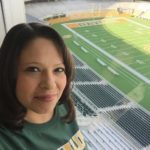
Bridget Heins is the Director of Community Relations for Rapoport Academy Public School and a proud, life-long resident of the Waco Community.
The Act Locally Waco blog publishes posts with a connection to these aspirations for Waco. If you are interested in writing for the Act Locally Waco Blog, please email [email protected] for more information.
Tuesday, March 26, is American Diabetes Association (ADA) Alert Day®, and the YMCA of Central Texas wants residents of McLennan County to know their risk for prediabetes and type 2 diabetes, as well as preventive steps they can take today to reduce the chances of developing the disease.
In the United States alone, diabetes affects over 30 million people; another 84.1 million Americans have prediabetes, yet only about 10 percent are aware of it. These statistics are alarming, and the impact on the cost of health care (in 2012 alone, the ADA estimates that diabetes cost the health care system $245 billion) makes preventing the number of new cases of type 2 diabetes more important than ever before.
The nation’s struggle with obesity and type 2 diabetes is no surprise but the number of people with prediabetes is a growing issue, especially when so few people realize they have the condition. Prediabetes is a condition in which individuals have blood glucose levels that are higher than normal, but not high enough to be classified as diabetes. Often preventable, people with prediabetes can reduce their risk for developing type 2 diabetes by adopting behavior changes that include eating healthier and increasing physical activity. People with prediabetes are at risk for not only developing type 2 diabetes, but also cardiovascular disease, stroke and other conditions.
As the leading community-based network committed to improving the nation’s health the YMCA of Central Texas encourages all adults to take a diabetes risk test at www.ymca.net/diabetes. Several factors that could put a person at risk for type 2 diabetes include family history, age, weight and activity level, among others.
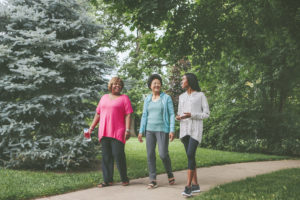
“Diabetes Alert Day is the perfect time to not only determine our own risk for prediabetes, but also encourage our family and friends to determine their chances of developing the disease,” said Crystal Hernandez, Program Manager for the YMCA’s Diabetes Prevention Program, Waco Family YMCA. “Studies show that people with prediabetes can prevent or delay the onset of type 2 diabetes by making simple lifestyle changes that include eating healthier and increasing physical activity.”
The YMCA of Central Texas is helping people potentially reduce the risk of developing prediabetes or type 2 diabetes by offering The YMCA’s Diabetes Prevention Program.
Some basic lifestyle changes that contribute to weight loss and an increased focus on healthy living can decrease the risk for type 2 diabetes. Among these are:
- Reduce portion sizes of the foods you eat that may be high in fat or calories.
- Keep a food diary to increase awareness of eating patterns and behaviors.
- Be moderately active at least 30 minutes per day five days a week.
- Choose water to drink instead of beverages with added sugar.
Incorporate more activity in your day, like taking the stairs or parking farther away from your destination.
Speak to your doctor about diabetes risk factors, especially if you have a family history of the disease or are overweight.
To learn more about the YMCA of Central Texas’s Diabetes Prevention Program, please visit ymcactx.org or contact Crystal Hernandez at 254-776-6612 or [email protected].
By Melissa Mullins

The theme for this year’s World Water Day (celebrated annually on March 22) is Water for All . What does this mean? Access to clean water and sanitation is a basic human right and the United Nations Sustainable Development Goal 6 establishes 2030 as a target for achieving this (which is right around the corner). 2.1 billion people live without safe water at home. In many parts of the world, people cannot simply turn on the faucet and have water come out. If water is not supplied to households or easily accessible central locations, how do people get water? Securing the family’s basic water needs daily often falls mainly to women and girls, and can take up such a large amount of time that it affects their ability to obtain education or thrive in other ways. Similarly, many people cannot simply flush their toilets to dispose of human wastes. On a global scale, more than 700 children under 5 die each day from diarrhea related to unsafe water and sanitation .
Here in the U.S., communities struggle with issues such as lead-contamination of drinking water – we’ve all heard of the on-going struggles in Flint, Michigan. But getting concerned about Water for All on a global scale for may be difficult because, after all, we can turn on a faucet and flush a toilet pretty much anywhere we go. What about water issues closer to home?
Water for people can be water for fish and wildlife too, although there may be competing demands for water. Balancing these demands to try to ensure adequate water for all, especially in places subject to drought (sound familiar?) or water scarcity is one of the major things that natural resource and other public agencies deal with. If you want to learn about, help protect, or just experience and enjoy our water resources in the Waco Community, there are so many opportunities do so and they are growing all the time! Here’s a few suggestions:
Learn: Where does your water comes from and how does it get to you? Where does it go when you flush the toilet and how is it treated? If you don’t know the answer to these questions (and it will be different depending on where you are in the Greater Waco area), I challenge you to figure it out!
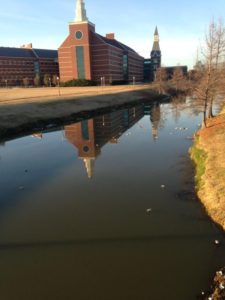
Keep it Clean and Conserve: Join Keep Waco Beautiful for the quarterly Brazos River Cleanup coming up on April 13th, or for one of their rainwater harvesting classes. Group W Bench litter patrol non-profit regularly plans clean-ups around our community. Everyone’s probably seen the upsetting picture of the sea turtle with the plastic straw up its nose . Did you know that 80% of ocean pollution begins on land (including plastics, but also other pollution)? That means that Whataburger cup and non-trash pollution that starts here in Waco can end up in the Gulf of Mexico (yes- Waco Creek flows to the Brazos River, and the Brazos River flows to the Gulf!)
Check yourself and ask local businesses and governments what they are doing: Being a good steward of water means more than turning off the faucet when you brush your teeth or taking shorter showers. Could we reduce the need for so many river clean-ups if we didn’t use disposable water bottles and straws in the first place? Could we support businesses that provide better alternatives to the waste generated with our “convenience lifestyle”?
Many people don’t realize that energy production is a major user of water in the U.S. Can you carpool some places you don’t already or even walk? Can you attend public meetings (such as have been occurring recently in Waco) regarding setting community-wide goals for transitioning to sustainable energy sources? The City of Waco’s long-term goals include improved public transportation and improvements to our city’s walkability and bikability , but there’s still a lot of work to be done, and your voice and energy as a community member are valuable.
Enjoy our water resources: Take a walk on the Waco Riverwalk that links Cameron Park, Downtown, and the Baylor campus, on both sides of the river (free!). Or, get out on the water- did you know that we have not one but two Texas paddling trails in downtown Waco? There are two paddling companies where you can rent canoes or kayaks, and for those with their own boats the Waco Paddle Club organizes outings on local water bodies. There’s a pontoon boat tour that is fun for residents as well as Waco visitors. Want to head out to the lake? You can purchase an annual pass from the US Army Corps of Engineers that gives you access to all the parks around Lake Waco. Want your kids to be safe while at the lake? The Corps offers water safety programs designed to reduce water-related fatalities; in addition to always wearing a life jacket, swimming lessons are one of the best things you can do to ensure your family’s safety around water, and swimming lessons are available through the YMCA of Central Texas (including financial assistance). Take your dogs on a hike or practice your nature photography or birdwatching skills at the beautiful Lake Waco Wetlands – or join Cameron Park Zoo staff for National Frog Month to explore and search for frogs at the Wetlands every weekend in April.
Celebrate: There are many community events that are affordable or free and have water-related connections. Of course, Act Locally Waco keeps us up to date on all the happenings. Keep the “Water for All” celebration going throughout the year!
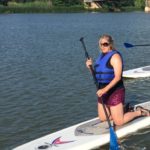
Melissa Mullins is a water educator who works at Baylor University’s Center for Reservoir and Aquatic Systems Research. The Center celebrated World Water Day by facilitating citizen science water quality testing in after-school science clubs, at the Mayborn Museum and at Girl Scouts of Central Texas STEMfest.
Press Release – The community’s help is needed to deal with the serious problem of child hunger in McLennan County, which worsens in the summer when many children are home from school and cannot receive free, nutritional meals provided in schools. A special spring food drive is being conducted to aid in this effort. The ninth annual “Spring Onto Summer Food Drive,” which will take place on Saturday, April 13, 2019, is designed to help local food pantries better meet the increased demand for supplemental food that is expected during the summer—a time when there is also a decrease in food and monetary donations to these organizations.
Pantries to receive food donated through this drive are Shepherds Heart Food Pantries, Salvation Army, and Caritas of Waco.

When school is out families in need have more mouths to feed at home. The demand for food is much greater at local pantries. We are asking the community to help stock the shelves of these local pantries to assist them in caring for people in need.
Individuals are encouraged to donate food on April 13th between 9 a.m. and 5 p.m. at one of the following locations:
- Wal-Mart, 1521 N IH-35, Bellmead
- Wal-Mart, 600 S. Hewitt Dr., Hewitt
- Wal-Mart, 4320 Franklin, Waco
- Wal-Mart 733 Sun Valley Blvd, Hewitt
- Sam’s Club, 2301 E. Waco Drive, Bellmead
- Brookshire’s Food Stores, 100 Peplow St., Robinson
- Brookshire Brothers, 406 N Frontage Rd, Lorena, TX 76655
Volunteers will be handing out lists of needed food items and encouraging shoppers to purchase such items while in the store and to place this food in specially marked containers before leaving. Among needed food items are canned meats, canned vegetables, cereals, baby food, peanut butter, macaroni & cheese, dry beans, rice, corn meal and pasta/sauces. Monetary donations are also accepted.
Wal-Mart and KXXV-TV–Channel 25 are serving as corporate sponsors for the drive.
For information about how to donate to the food drive, please go to www.shepherdsheartpantry.org or contact Bob Gager at 254-722-9517 or [email protected] or Buddy Edwards at 254-722-7698 or [email protected].
By Brooke Davilla
Imagine that you want to run a marathon, become a cake decorator, travel the world, or start a new business. Okay, now what? Wing it. Wait, no. What? Of course we don’t wing it. Most of us would not launch into an important undertaking without some level of preparation. For some, it may be enough to watch a quick You Tube video or read the highlights, while others may seek to become experts on the subject. Either way, we typically approach new endeavors with an openness to learn.
Yet, when it comes to raising children, one of the biggest adventures in the human experience, we tend to think we must intuitively know what to do and instinctively be able to do it. Worse yet, when we find ourselves in a parenting pickle, we often feel a sense of shame around the idea of asking for help. What if we approached parenting with the same openness to learn as we would any other adventure?
Four reasons why you should attend a parenting class:
1. Gain tools: Stuck with only the tools your caregivers gave you? A parenting class can help you learn new strategies to engage, guide, and discipline. As children grow and change, what worked yesterday, likely won’t work today, and what works for this child rarely works for the next. As my husband likes to say, “You can never have too many tools.”
2. Learn the latest: Research on human development and relationships continues to evolve. Thoughts on best practices for raising children has changed over the years. Attending a parent education class is one way to stay up to date on evidence-based practices when it comes to caring for little ones.
3. Build confidence: Am I doing enough to ensure my child grows up to be a well-adjusted contributing member of society? The million-dollar question that every parent asks every day. Having a safe environment to ask questions and practice new skills is a great way to strengthen your confidence as a parent.
4. Create community: ‘It takes a village’ might be cliché, but oh-so-true when it comes to parenting children. Attending a group parenting class will give you a chance to meet other caregivers and expand your support system.
Whatever journey brought you to your caregiving role – surprise or planning, biology or adoption, permanent or temporary – a parenting class could add to your preparation to handle the many loops of the adventure we call parenting. MCH staff is passionate about supporting children, youth, and families and have been trained to teach three different evidence-based curriculums – Nurturing Parenting®, Circle of Security®, and a Trust-Based Relational Intervention® class called Connected Caregivers. There are always new groups starting and they are always open to partnering with schools, organizations, and congregations to open a new class.
Wherever you are on your parenting journey, MCH Family Outreach exists to support you! Please call 254-750-1263 to find out more about our free services and determine how we can best serve you and your family.
6 Week Nurturing Parenting (NP) classes curriculum include Philosophy and Practices of Nurturing Parenting; Ages & Stages (Infants & Toddlers); Brain Development (Children & Teens); Building Self-Worth; Communicating with Respect; Praising Children and their Behavior; Dealing with Stress; Understanding Feelings; Alternatives to Spanking; Family Morals, Values and Rules; Humor, Laughter and Fun with Children. Childcare is not provided.
Next Class: April 30 – June 4. Tuesdays, 12:30 – 2:30 PM. Tuition: Free. To register, call: 254-750-1263
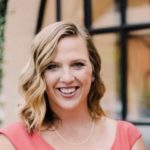
Brooke Davilla is the Director of MCH Family Outreach Waco for Methodist Children’s Home. She graduated from Baylor University with a MSW in Social Work, concentration in Community Practice, where she now teaches part-time. Brooke is passionate about cultivating a trauma informed community and is a TBRI® Practitioner. She enjoys spending time with her husband and two sons traveling, being in nature and often at the baseball fields. You can reach Brooke at [email protected].
The Act Locally Waco blog publishes posts with a connection to these aspirations for Waco. If you are interested in writing for the Act Locally Waco Blog, please email [email protected] for more information.
By Kristen Drumgoole
Parenting: It’s the best, hardest job. It’s joy and laughter and fun…and heartache, worry, and weariness. Behavior challenges, financial strain, traumatic experiences, and many other things can be roadblocks to family bonding and growth.
MCH Family Outreach exists to offer support to families facing such challenges. We support families in a number of ways – through caregiver education, connecting families to community resources, and planning for achievement of goals set by family members. One of the unique ways MCH Family Outreach seeks to support families and caregivers is through Caregiver Empowerment Groups (CEGs). CEGs are regular meetings designed to offer support and empowerment to caregivers through education, discussion, and the opportunity to connect with and learn from others who are on a similar journey. These groups are always open to new members, so you are welcome to drop by any of them at any time.
Here is a quick overview of the Caregiver Empowerment Groups we currently offer:
Adoptive & foster parent CEG: This group offers monthly meetings to support adoptive and foster parents. The next meeting will be Friday, March 22, from 6:45-8:30 PM, at First Baptist Church, Woodway, 101 N. Ritchie Rd. Childcare is available with a prior RSVP. To RSVP or get more information, contact Marissa Smith at [email protected] or call 254-750-1263.
Grandparent & relative caregiver CEG: This group is open to grandparents, aunts, uncles, cousins – anyone who has taken in a child of a family member or friend. Raising a relative’s child as your own comes with a unique set of joys and challenges, and this group exists to support caregivers through this journey. The next meeting will be Monday, March 25, from 10:00-11:00 AM at the MCH Family Outreach Center, 524 W. Waco Drive. Childcare is not provided. For more information, contact Kristen Drumgoole at [email protected] or call 254-750-1263.
Spanish language CEG: This group is open to all parents and caregivers who speak Spanish. The next meeting will be Wednesday, March 27, from 12:00 PM-1:00 PM at La Puerta Waco, 500 Clay Ave. (First Baptist Church, Waco, 2nd floor). Childcare is provided. For more information, contact Ana Chatham, at [email protected] or call 254-750-1263.
Family fun CEG: This group is open to all families who want to build attachment and bonding by having fun together! Parents and children will learn skills like healthy communication and appropriate rules and boundaries in the home, through play and family fun. The first meeting will be Saturday, April 13 at the MCH Family Outreach Center, 524 W. Waco Drive, from 10 AM-noon. Please RSVP to this group by emailing Maegan Bennight at [email protected] or calling 254-750-1263.
Wherever you are on your parenting journey, MCH Family Outreach exists to support you! Please call 254-750-1263 to find out more about our free services and determine how we can best serve you and your family.
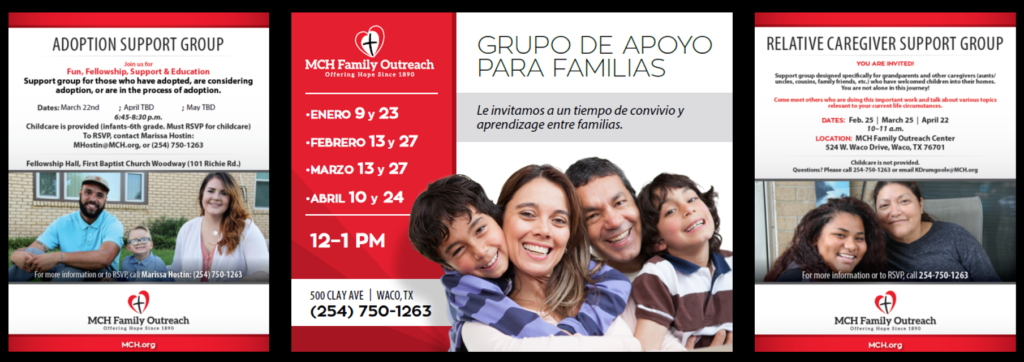
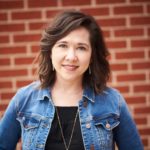
Kristen Drumgoole has been a Case Manager with MCH Family Outreach for one year. She holds her MSW degree from the Diana R. Garland School of Social Work at Baylor, where she is also an adjunct instructor. Outside of work hours, you’ll likely find Kristen at her church (Calvary Baptist) or dancing up a sweat at the REFIT Studio. She has called Waco home for the past 6 years.
The Act Locally Waco blog publishes posts with a connection to these aspirations for Waco. If you are interested in writing for the Act Locally Waco Blog, please email [email protected] for more information.
By Clay Springer
Last May, three local entrepreneurs came to me with a challenge. They had purchased a 14- passenger bicycle car six months earlier and launched “Waco Pedal Tours” (WPT), a startup providing entertainment tours in Waco’s downtown.
Cory Dickman, Jake Cockerill, and Danny Abarca are true entrepreneurs, ready to bet it all in the belief that their product, a pedal car, could play a vital role in shaping the downtown experience for locals and guests alike. But, by the time they came to me, they were emotionally drained. It turns out the pedal car they had purchased was a hodge-podge of mis-matched imperial and metric parts that the previous owners had thrown together with a working philosophy of “get the next tour finished and worry about the rest later.”
Keeping this Frankenstein pedal car running was a nightmare. They had spent countless hours doing cross-country searches and talking to engineers and designers and still they had no solid replacement parts. I signed on to help with the project, and we spent additional countless hours researching, brainstorming, designing, and working with the best old-school machinist in Waco until we finally had the pedal car back on the road.
Even after my involvement with WPT, however, problems with the old pedal car were a constant problem: holes in watered batteries, cracked brake drums, split axle shafts, electrical shorts, etc. The original pedal car was built in China and then shipped to America for final assembly. Most problems related to a metric or Chinese version of something not being compatible with what was readily available for purchase in Waco, Texas.
We realized it was time to build from the ground up. We wanted a frame that could be repaired with parts from local stores or junkyards in 24 hours or less. We wanted a better suspension for a more comfortable ride on bumpy roads. We spent hours scheming possible new additions to the bike: water misters for hot days, on board hot chocolate tap for winter, karaoke, massive sound system, air-ride suspension for comfort, Mario Kart (a personal favorite and I still remain the 9-time undefeated champ at the annual RAPS Mario Kart races!), and so much more.
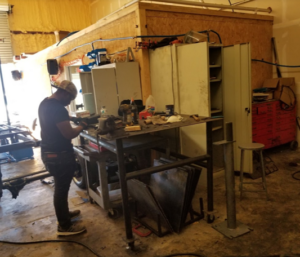
We had lots of ideas for improvement based on customer comments… added space between pedals and bar for folks with long legs, a space to lock up personal items or coolers, a step with a handle for loading and unloading, and an extra seat or two. We wanted a technical service manual and a troubleshooting guide.
Of course, all of this conversation about new features and improvements led to some dreaming about scaling the product up into multiple pedal cars and serving as a vendor for other entertainment startups.
Cory, Jake and Danny knew we could build a better pedal car, but the crossroads of time and money spent to get the original bike on the road again had taken its toll. As we dreamed up design ideas and worked through trade-offs we kept up a running cost analysis on building a new pedal car. How could they afford it? Who would build it?
The pedal car project fascinated me. I was drawn to the problem-solving challenge of working on a vehicle that seems simple from the curb but is oddly sophisticated below. I began to wonder if this was a job that my students at Rapoport Academy Public School (RAPS) could do.
For over a decade the RAPS robotics team has competed every year in the FIRST Robotics Competition (FRC). This competition focuses on technical skills like DC electronics, CAD, CAM, CNC machining, pneumatics, LEDs, fasteners, gears and pulleys. One problem we have always faced while competing in FRC is the time commitment. Our students have to balance their time between wage earning jobs and after school activities like robotics.
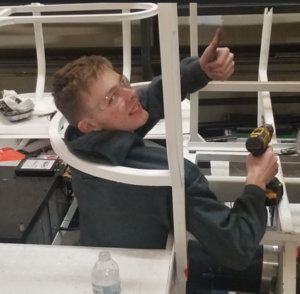
Just like that, the idea was born: bring students on at WPT as full W-4 employees! The students could earn OSHA certification and be covered under workers comp insurance. This would help students balance having a job to earn an hourly income and earning class credit. Unlike in a regular robotics project, in this build we wouldn’t have to fundraise the cost of the materials, so we could spend more time teaching fabrication techniques and safety.
We formed a team – four RAPS high school students, three partners from WPT, and one teacher (me!) – we were in it not just to build a product, but to build a company.
It is almost impossible to list all the good outcomes and highlight moments that have come from this project: The close personal interactions between the students and owners; the opportunity to learn project management, marketing, finances / loan structure; the opportunity to connect STEAM (Science, Technology, Engineering, Art, and Math) learning from the classroom to real experience in the field. Students were pressed to quickly learn how to read, interpret and fabricate blueprint drafts. They learned how to communicate within a team to get a project up and running.
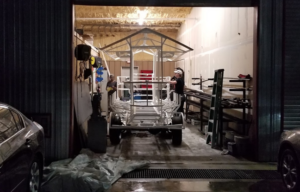
The brightest highlight by far has been the four high school students themselves. Each student brought a unique skill set and personality to the team. I have known these students since they were in the 5th and 6th grades and it was an incredible experience to go from being a teacher in front of a class to working alongside them on a daily basis. We worked through conflict together. We got in trouble with management for playing music too loud together. We spent time talking about cars, college, and life… but most of all we learned together.
In the beginning this project was about welding some tubes together, throwing axles and brakes under it, adding a little paint, installing a stereo, and sending a pedal car down the road. It soon transformed into a project about high school students developing the skills to be successful in college, career, and life.
Yes, you have to know how to align gears, and calculate weight-to-gear ratios to build a pedal car, but those are skills we can teach in a classroom. You cannot teach the rush you feel when you meet a high-stakes deadline, or the satisfaction that comes with successfully managing a project that relies on three different people with six different parts progressing at once, or the attention required to improve a design by listening to customers. You have to experience these things. I have learned many, many things through this work-based learning partnership, but one of the most impactful things I will take from it is, “You cannot simulate authentic real-world learning.”
After two weeks of rigorous testing over spring break we will fix and fine tune any problems that arise with the new pedal car. Then we will bring on another set of talented students to help write the technical guides that will accompany the pedal car, to use RAPS drones and cameras to video and photograph the pedal car for marketing packages and social media posts, and to serve as drivers for tours.
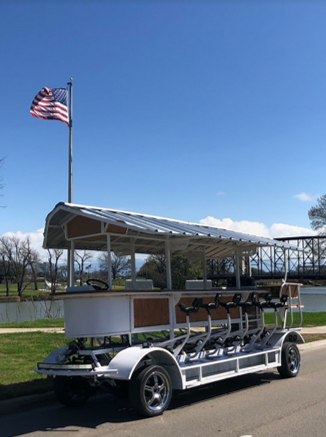
This new pedal car is a prototype, created from our imagination. It is full of imperfections with improvements to be made, but I guarantee you this: our RAPS team is up for the challenge and we are just getting started. So, go take a ride on the new pedal car, your dollars will support local education and you might just have one of the builders from our team as your driver!
Waco Pedal Tours and Rapoport Academy Public School entered into a formal partnership to promote Entrepreneurship and STEAM education together. From trade and technical disciplines to entrepreneurial finance and marketing, local companies like Waco Pedal Tours are the key to the success of our next generation. I applaud WPT for taking a risk on a couple of knuckleheads with power tools (me included).
Rapoport Academy focuses on entrepreneurship in STEAM disciplines. We are looking to partner with more companies to meet the interests of every student. I would personally love to connect you with some amazing young talent to help grow your idea or established business.
How could your business and our students mutually benefit from the tools, training and facilities that RAPS has to offer? How can we create some authentic student learning experiences together? There is a little something for every passion in entrepreneurship and it takes every person pedaling for the bike to move forward.
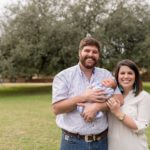
Clay Springer currently serves as STEAM and Career and Technical Education Director for Rapoport Academy Public School. Clay started his educational career at Rapoport Academy in 2010 as a teaching assistant for Quinn Middle school before becoming a classroom teacher and advocate for STEM and Authentic education. Clay and his wife, Joi, welcomed their first child, Shepherd, on Thanksgiving day 2018. They enjoy spending time on the Brazos River on old boats that Clay boldly claims someday will be as good as new.
The Act Locally Waco blog publishes posts with a connection to these aspirations for Waco. If you are interested in writing for the Act Locally Waco Blog, please email a[email protected]for more information.
By Rae Jefferson
Family Health Center has a long history of working to serve the primary care needs of low-income and uninsured patients in the Waco area. With 14 clinics across McLennan County, FHC is constantly expanding and working to improve the scope and quality of care offered to patients. Here are five programs and strategies we use to offer the best medical, dental, and behavioral health care we can to our community.

1. We address social problems that negatively affect the mind and body. Social determinants of health are conditions within a home, school, workplace, and community that influence health risks and outcomes. According the U.S. Centers for Disease Control, “unstable housing, low income, unsafe neighborhoods, or substandard education” can have a negative effect on a person’s health, both physical and mental.
While addressing these health concerns is often complicated, FHC has implemented a few programs to help find solutions. Low literacy levels are shown to increase “adverse health outcomes, including increased mortality, hospitalization, and in some cases poorer control of chronic health conditions.” Reach Out and Read is a national program that supplies free books to FHC patients aged 6 months to 5 years. The program, currently sponsored by the Junior League of Waco, helps doctors and parents ensure young patients have tools to develop literacy skills that can improve health outcomes later in life. Books are available in both Spanish and English for all age levels.
Additionally, FHC has formed a Medical-Legal Partnership (MLP) with Greater Waco Legal Services, which helps medical providers understand and treat legal issues affecting the health of patients. The MLP allows medical professionals at FHC to refer patients to legal services, and for the legal team to have a physical presence in the medical clinic to consult with patients and providers about how to address health-harming legal needs. The partnership also educates medical staff on how to recognize health-harming legal needs during patient visits. Interactions between patients and medical staff or the legal team are confidential, and citizenship status is never shared with outside parties.
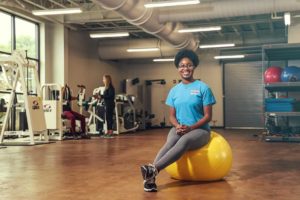
2. We offer unconventional approaches to managing health and promoting wellness. If you’re around FHC long enough, you’ll realize we care a lot about treating our patients in ways that will create lasting change in their lives. Through unique prescription programs, we give patients the tools to succeed in achieving a healthy and active lifestyle. Physicians can give patients a prescription for exercise, allowing them free access to the Wellness Center, located in our Madison Cooper Community Clinic. Fitness advisers work with each patient to evaluate exercise needs and abilities. Baylor University and individuals in the community have graciously donated all equipment in the workout facility.
Physicians also have the ability to give patients a Produce Prescription, which provides them with a free box of produce each week while the program is in season. Each box includes seasonal produce grown and provided by World Hunger Relief, Inc., as well as recipe cards to assist patients as they prepare meals.
3. We offer support groups that can improve health and well-being. Centering Pregnancy is a program that allows expectant mothers to find support and familiarity with one another. For some patients, familial support is limited or nonexistent. The groups allow them to find much needed community while decreasing chances of experiencing complications during pregnancy and delivery. Foster care groups are also available, and allow families with foster children to share their joys, challenges, and support for one another.

4. We are developing a greenspace in a Waco neighborhood. The Community Gathering Space is under development at our main clinic at Colcord Avenue and N 16th Street. In the future, the plot of land, adjacent to the Wellness Center, will be a greenspace with sitting areas and a walkway. It will also feature a small garden mirroring vegetables in the Produce Prescription boxes, which will allow patients to see the produce at all stages of growth and encourage a foray into home gardening. We broke ground in January and have already built a few raised garden beds and a portion of the walkway.
5. We bring behavioral health care into the exam room. Physicians in the U.S. often report that their patients do not have access to adequate mental health services. Furthermore, mental health diagnoses made by primary care doctors are often incorrect. Integrated Health Management is a method of treating patients that brings more accurate mental health care into exam rooms and gives them more time with a team of healthcare professionals. During routine visits, patients who would benefit can choose to see a mental health professional, also called an Integrated Health Manager, during the same visit to quickly receive a diagnosis and discuss treatment options. This process allows patients to more easily access mental health resources without sacrificing quality of care.

Rae Jefferson is a creative, Netflix binger, and marketing professional, in that order. Originally from Houston, she stuck around Waco after graduating from Baylor University with a B.A. in Journalism, PR, & New Media and a minor in Film & Digital Media. Now she’s the Communications Director at Family Health Center, where she gets to spend each day serving Waco. When she’s not working, find her at home snuggled up with her dog-daughter, Charlie, watching “The Office” for the hundredth time.
The Act Locally Waco blog publishes posts with a connection to these aspirations for Waco. If you are interested in writing for the Act Locally Waco Blog, please email a[email protected] for more information.

